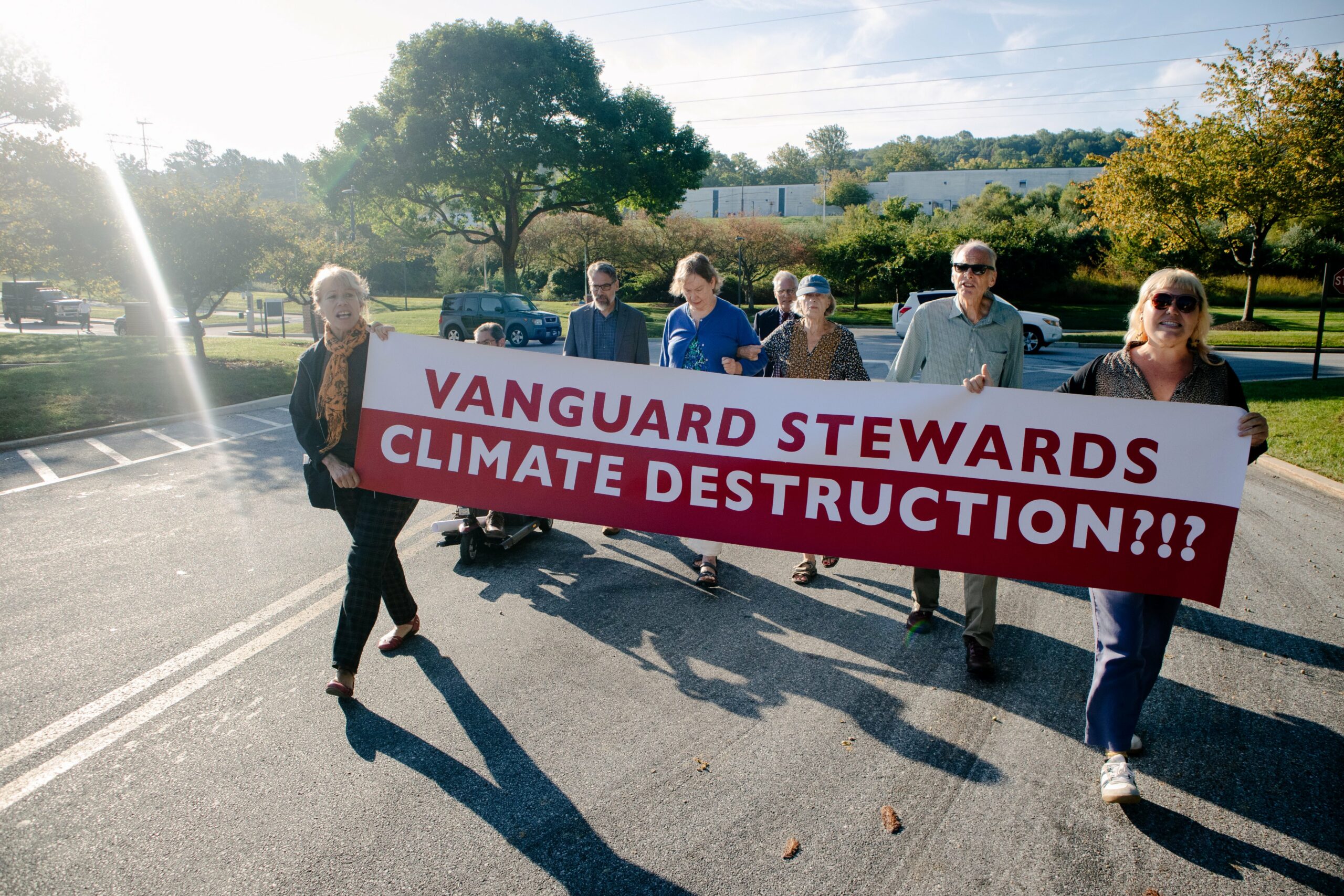Vanguard recently released its 2022 Investment Stewardship Annual Report. To those paying attention, there are no surprise statements in this report – but the documents serve as a disappointing and alarming reminder that the company’s approach to climate risk is insufficient. The report, despite its 88 page length, is lacking in any substance when it comes to climate, or much of anything else.
The following statement by John Galloway, Vanguard’s Investment Stewardship Officer, summarizes the entirety of the report: “Our approach to engaging with portfolio companies and executing proxy voting is firmly grounded in our objective to promote long-term value for our funds and fund shareholders. Our funds’ passive investment strategies are also reflected in our approach to investment stewardship—we do not seek to dictate portfolio company strategy or operations. Rather, we look to understand how boards are composed to provide for their company’s long-term success, how they consult with management on strategy and oversee financially material risks, how they align executives’ incentives with shareholders’ interests, and how they provide shareholders with a voice and a vote.”
According to Galloway and his team, this framework is ultimately reliant on the principle of disclosure rather than by pushing management at portfolio companies to change course.
Why is Vanguard’s approach to climate risk insufficient?
Vanguard takes credit for casting more than 180,000 proxy votes at more than 20,000 company meetings and engaging with 1,300 portfolio companies across sectors. However, we have yet to witness a real impact on how portfolio companies, specifically high carbon emitters, are planning to align their business models to a 1.5°C trajectory and reduce emissions. (Limiting warming to another 1.5°C is the goal of the Paris Agreement, based on the amount of additional warming that scientists believe the planet can sustain and still avoid the worst impacts to humanity.)
Some of the largest publicly listed European and American international oil and gas companies like TotalEnergies, Shell, BP, Equinor, ENI, Repsol, ExxonMobil, Chevron, ConocoPhillips are among the 1300 companies that Vanguard has engaged in 2022. According to a recent report by Reclaim Finance these companies have failed so far to design and implement a comprehensive transition plan to ensure in the coming years we collectively have a shot at limiting warming to 1.5°C.
While the risks to our planet of warming beyond 1.5°C are substantial, asset managers like Vanguard have a responsibility to look specifically at the economic risks. If Vanguard continues to ignore climate risk, its investors will face increasing wealth destruction. According to Swiss Re, climate chaos could reduce global GDP by 11% to 14% by 2050—a $23 trillion loss. And as the world makes the necessary transition to clean energy, about half the world’s fossil fuel assets could become worthless by 2036.
This transition to clean energy is not only necessary, it’s inevitable; even BlackRock’s Larry Fink admits this. But instead of wising up and working to address climate risk, Vanguard continues to invest in fossil fuels and expose its investors to potential stranded assets. In fact, Vanguard is almost doubling down on fossil fuels, with a new report titled “Investing in Climate Chaos” showing that Vanguard holds $269 billion in fossil fuels, a number that is actually slightly higher than BlackRock’s $263 billion. Together, the two US-based asset managers account for 17% of all institutional investments in fossil fuel companies.
Engagement cannot be the end all solution.
Looking at the hard evidence of how fossil fuel majors are unwilling and failing to adapt to what the climate crisis requires, Vanguard’s engagement strategy must shift from disclosure to actual decarbonization. And while the company states in the report that beginning in 2023, it will provide quarterly reporting detailing its engagement activity and rationale for key votes, a welcome step in the right direction to improve transparency, Vanguard must make clear which sectors and companies it is prioritizing, timelines for engagement, and the consequences of insufficient climate action from its portfolio companies.
As of 2021, Vanguard’s stewardship team had only one staffer per 300 portfolio companies – a figure significantly below that of major competitors like BlackRock and LGIM. And while it has increased its corporate engagement and expanded its stewardship team in the last year, it still has one of the worst voting records in the industry when it comes to climate-related shareholder resolutions.
Vanguard’s case by case analysis and voting approach is alarming, and that is why it should immediately begin to flex its proxy voting muscle more aggressively by adopting a default position to vote in favor of viable climate shareholder resolutions and against corporate boards and directors when a company fails to meet climate performance standards or lacks a clear climate transition plan that aligns with a 1.5°C pathway.
In the annual report, Vanguard CEO Tim Buckley states that Vanguard’s stewardship program represented in 2022 it’s clients interests with a mandate “to promote long-term shareholder returns at the companies in which Vanguard-advised funds invest. Our investors depend on those returns for their retirements, their children’s education, affording a dream home, and more.”
But if Vanguard is serious about this mandate, it cannot continue with business as usual jeopardizing our climate and the millions of investors who have placed their trust with this company to ensure their financial returns are protected.
As a universal owner of the economy with immense fossil fuel exposure, Vanguard should urgently work to decarbonize its portfolio according to science-based targets and to expand sustainable investment options. Not only should the company ensure that all its new investment products are on a zero emissions pathway, but it should adopt and apply rigorous climate risk criteria and analysis across its entire portfolio including in primary markets.
